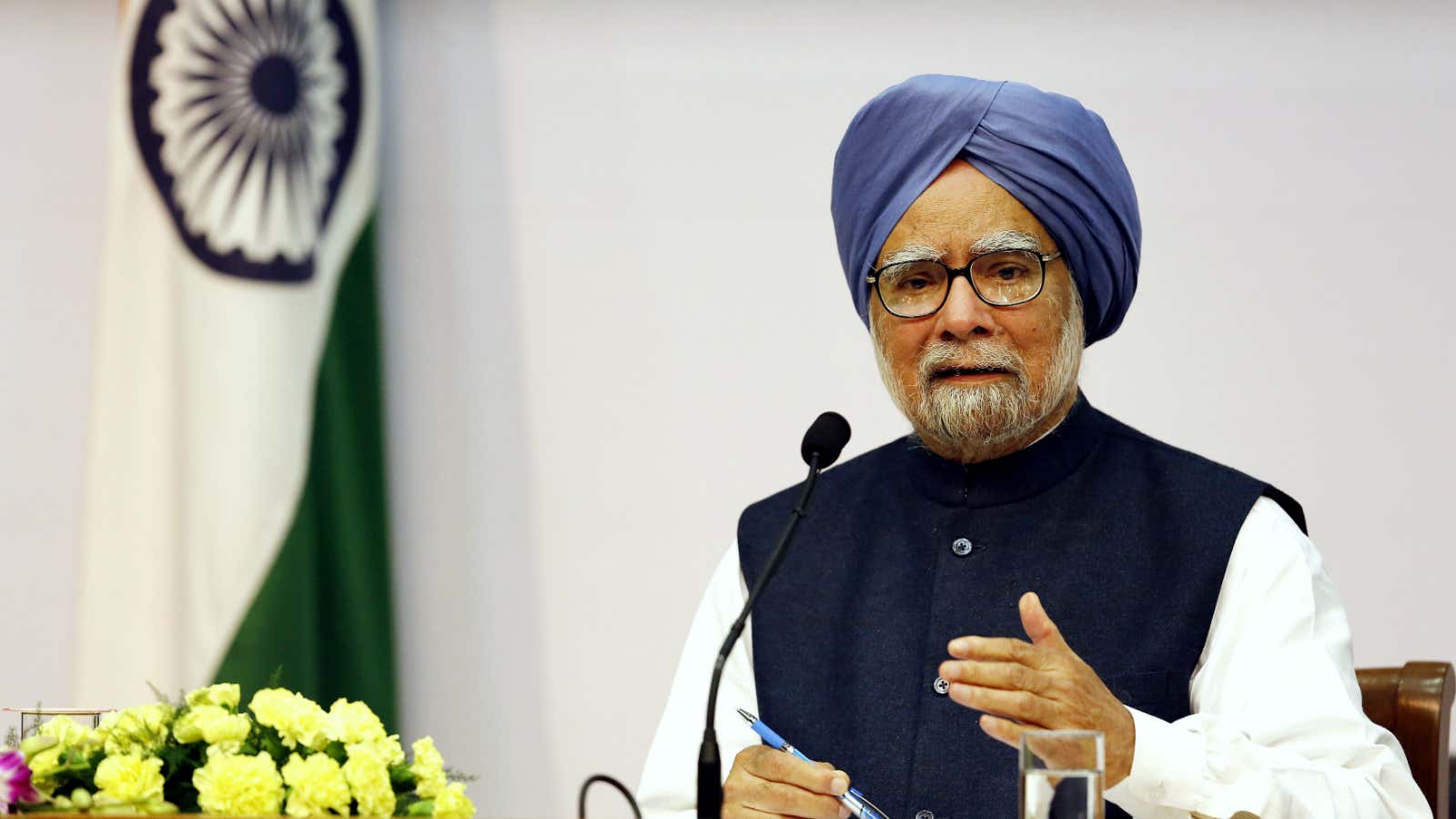Manmohan Singh knows a thing or two about economics. On Nov. 24, the former Indian prime minister and globally respected economist spoke for the first time on the Narendra Modi government’s stunning move to demonetise the country’s two most popular currency denominations.
The soft-spoken Singh, widely credited for launching India’s economic reforms in 1991, predictably seared through many of the government’s claims even though he did not dispute the intent—to curb unaccounted wealth and counterfeit currency notes—of the massive exercise launched on Nov. 08.
Often ridiculed as a puppet during his decade-long tenure as India’s prime minister till 2014, Singh’s sharp rebuke in the Indian parliament was in contrast to his image of the mostly-mute leader. He is alleged to have overseen one of the most scandal-ridden governments in India’s history, although his own conduct has rarely been doubted by even the harshest of his critics, particularly those in the opposition.
Yet, on Nov. 24, the usually low-key former prime minister’s words rang loud in the Rajya Sabha when he dubbed the demonetisation exercise “organised loot and legalised plunder”—terms often used by the opposition during Singh’s reign which saw a series of alleged scams, such as Coalgate, 2G, and CWG, surfacing at regular intervals.
In parliament, Singh reflected the views of many observers that the government’s demonetisation move had been massively mismanaged.
Urging prime minister Modi to find “pragmatic ways” to reduce the hardship of the millions whose lives have been thrown into disarray by the government’s decision, Singh cautioned that demonetisation could bring down India’s GDP growth by a massive two percentage points.
The following is the full transcript of Singh’s speech in the Rajya Sabha:
I rise to highlight some of the problems that have arisen after the decision to demonetise Rs500 and Rs1000 currency notes.
Prime minister has been arguing that this is the way to curb black money, to prevent growth of forfeited currency notes and also to help in control of terrorist finance activity.
I do not disagree with these objectives. But what I do want to point out is that in the process of demonetisation, monumental mismanagement has been undertaken [applause] about which there is no opinions in the country as a whole.
Even those who say that this measure will do harm or will cause distress in the short term but be in the interest of the country in the long-run, I am reminded of what John Keynes said once: In the long run, all of us are dead.
And therefore it is important to take note of the grievances of the people, the ordinary people who have suffered as a result of this imposition on the country overnight by the prime minister.
And I say so with all responsibility, that the outcome… we do not know what will be final outcome. Prime minister has said that we should wait for 50 days. Well, 50 days is a short period, but for those who are poor and deprived section of the community, even 50 days torture can bring about disastrous effect. And that’s why about 60 to 65 people have lost their lives. Maybe more.
And what is more is, what has been done can weaken and erode our people’s confidence in the currency system and in the banking system. One, I would like to know from the prime minister, the names of any countries he may think of where people have deposited their money in the banks but they are not allowed to withdraw their money. This alone, I think, is enough to condemn what has been done in the name of [inaudible].
And sir, I would further like to point out that in my opinion, this scheme of (de)monetisation, the way it has been implemented will hurt agricultural growth in our country, will hurt small industry, will hurt all those people who are in the informal sectors of the economy. And my own feeling is that the national income, i.e. the GDP of the country, can decline by about two percentage points as a result of what has been done. This is an underestimate, not an overestimate.
Therefore, I feel that the prime minister must come with some construction proposal: How we can implement this scheme and at the same time, prevent this distress that is being caused to the common people?
It is no good that every day the banking system comes with modification of the rules, the conditions under which people can withdraw money. That reflects very poorly on the prime minister’s office, on the finance minister’s office and on the Reserve Bank of India. I am very sorry that the Reserve Bank of India has been exposed to this sort of criticism, which I think is fully justified.
I, therefore, would not like to say much more than this. I urge upon the prime minister to find practical, pragmatic ways and means to relieve the distress of the people who happen to be a great majority of our people.
After all, 90% of our people work in the informal sector, 55% of our workers in agriculture are feeling distressed. The cooperative banking system, which serves a large number of people in the rural areas, is non-functional. It has been prevented from handling [inaudible].
So, all these measures convince me that the way this scheme has been implemented is a monumental management failure and in fact, it is a case of organised loot and legalised plunder [inaudible].
With these words, sir, I conclude. It is not my intention to pick holes in what one side does, or another side does. But I sincerely hope that the prime minister will, even at this late hour, will help us to find practical, pragmatic ways and means to provide relief to the suffering people of this country.
Thank you.
